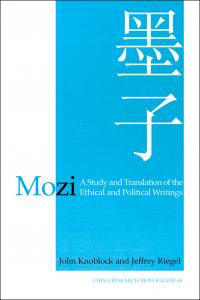Mozi
Mozi
John Knoblock, Jeffrey Riegel
The Mozi, an anthology of the Warring States period (453–221 BCE), is the earliest extended philosophical discourse in China on topics from aggressive warfare and prolonged mourning for the dead to frugality, love for others, and belief in divine agency. Based on an initial translation by the late John Knoblock, Jeffrey Riegel's groundbreaking work attempts to understand the Mozi in light of excavated manuscripts and recent scholarship on ancient Chinese philosophy.
As a nonprofit academic press, we need your support to publish our books. Your gift can help us make more of our titles available as e-books. DONATE NOW
Title information
The authors of the Mozi, an anthology of enormous scope and great importance, can be credited with having produced, during the Warring States period (453–221 BCE), the earliest extended philosophical discourse in China on a varied set of topics that range from aggressive warfare and prolonged mourning for the dead, to frugality, love for others and belief in divine agency. Professor Riegel's study and translation offers a new interpretation of the Mozi's thirty-six chapters on political and ethical philosophy. Based on an initial translation by the late John Knoblock, Riegel's groundbreaking work attempts to understand the Mozi in light of excavated manuscripts and recent scholarship on ancient Chinese philosophy.
John Knoblock
John Knoblock was professor of philosophy at the University of Miami. He studied and translated several classical Chinese texts, including the Annals of Lü Buwei, Xunzi, and Mozi.
Jeffrey Riegel
Jeffrey Riegel is professor emeritus of East Asian Languages and Cultures at the University of California, Berkeley. He is also professor emeritus of the School of Languages and Cultures at the University of Sydney. His research focuses on classical Chinese literature and early Chinese texts. He has studied and translated the Annals of Lü Buwei and Mozi.
M.A., Chinese, Stanford University; Ph.D., Chinese, Stanford University
Mozi
Tables — x
Preface — xi
Abbreviations and Conventions — xvi
Introduction — 1
I. Portrayals of Mozi — 1
1. Dates and Birthplace — 1
2. Master Mo and Master Kong — 2
3. Master Mo and the Xia Legacy — 2
4. Mozi as a Baseborn Artisan — 4
5. Mozi the Magician — 5
II. The Mohist School — 7
1. The Three Branches of Mohism — 7
2. The First-Generation Disciples — 9
3. The Grand Master — 9
4. The "Law" of the Mohist Community — 11
III. The Creation of the Text of the Mozi — 14
IV. Mohism’s Fate — 16
1. Dates and Birthplace — 16
2. Mozi’s Daoist Persona — 18
3. Knowledge of Mozi during the Tang and Song — 21
4. The Ming and Qing Reassessment — 23
5. Mozi in the Twentieth Century — 24
V. The Philosophy of the Political and Ethical Chapters — 26
1. The Chapters of Group 2 — 27
2. The Chapters of Group 1 — 36
3. The Chapters of Group 4 — 39
Group 1: The Syncretic Writings
Chapter 1: Cherishing Gentlemen — 41
Chapter 2: Cultivate the Self — 47
Chapter 3: On Dyes — 51
Chapter 4: On the Proper Model — 56
Chapter 5: Seven Worries — 61
Chapter 6: Avoiding Excess — 67
Chapter 7: Three Disputes — 75
Group 2: The Ten Doctrines
Exalt the Worthy — 79
Chapter 8: Exalt the Worthy (Upper) — 82
Chapter 9: Exalt the Worthy (Middle) — 87
Chapter 10: Exalt the Worthy (Lower) — 100
Exalt Conformity — 108
Chapter 11: Exalt Conformity (Upper) — 112
Chapter 12: Exalt Conformity (Middle) — 116
Chapter 13: Exalt Conformity (Lower) — 129
Impartial Love — 139
Chapter 14: Impartial Love (Upper) — 145
Chapter 15: Impartial Love (Middle) — 149
Chapter 16: Impartial Love (Lower) — 155
Condemn Aggression — 169
Chapter 17: Condemn Aggression (Upper) — 171
Chapter 18: Condemn Aggression (Middle) — 174
Chapter 19: Condemn Aggression (Lower) — 180
Moderate Consumption — 192
Chapter 20: Moderate Consumption (Upper) — 193
Chapter 21: Moderate Consumption (Middle) — 196
Moderate Burials — 201
Chapter 25: Moderate Burials (Lower) — 203
Heaven’s Will — 219
Chapter 26: Heaven’s Will (Upper) — 223
Chapter 27: Heaven’s Will (Middle) — 229
Chapter 28: Heaven’s Will (Lower) — 241
Explaining Ghosts — 252
Chapter 31: Explaining Ghosts (Lower) — 254
Condemn Music — 273
Chapter 32: Condemn Music (Upper) — 275
Condemn Fatalism — 284
Chapter 35: Condemn Fatalism (Upper) — 289
Chapter 36: Condemn Fatalism (Middle) — 297
Chapter 37: Condemn Fatalism (Lower) — 302
Group 4: Condemn the Ru and the "Mohist Analects"
Chapter 39: Condemn the Ru (Lower) — 312
Chapter 46: Master Gengzhu — 326
Chapter 47: Valuing Righteousness — 340
Chapter 48: Master Gongmeng — 352
Chapter 49: The Lord of Lu Asks a Question — 369
Chapter 50: Master Gongshu — 387
Appendix A — 391
Appendix B — 393
Appendix C — 396
Additional Notes — 401
Bibliography — 479
Index — 491
|
JOURNAL REVIEWS |
|
"The translations are based on files and a critical edition left behind by the late John Knoblock, but they have been thoroughly reworked and edited by Riegel, who has authored most of the volume....Scholars of early China as well as non-specialist readers with an interest in Chinese philosophy will be grateful to Riegel for his persistence in bringing together Knoblock's original work on the Mozi and his own insights. The result is a fine piece of work that, while not necessarily revolutionizing existing scholarship on the Mozi, offers a richly annotated and solidly researched translation that will prove very useful as a first point of reference to this fascinating text." ~Roel Sterckx, University of Cambridge, in Bulletin of the School of Oriental and African Studies (DOI: http://dx.doi.org/10.1017/S0041977X15000099) |
|
“I find this study and translation initiated by John Knoblock and completed by Jeffrey Riegel truly impressive: it is a wonderful compendium of knowledge on Mozi and Mohism throughout Chinese history. It is often more informative than argumentative, sometimes reflecting on different views, offering well-balanced opinions, pointing at subtle variations, making connections with other sources (especially the Lüshi chunqiu), and providing reliable translations. In many ways this is the most useful (and affordable) Mozi book that has come out in the last decades.” ~ Carine Defoort, University of Leuven, in China Review International 20, no. 3 & 4 (2013): 335–337. (https://muse.jhu.edu/article/617526) |


